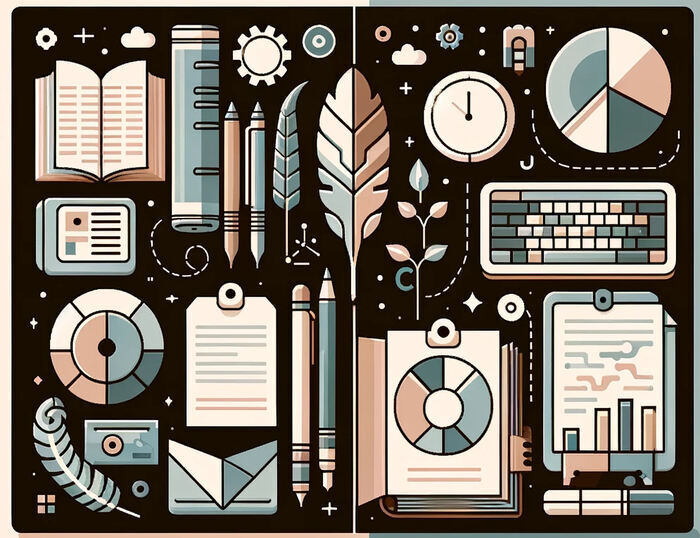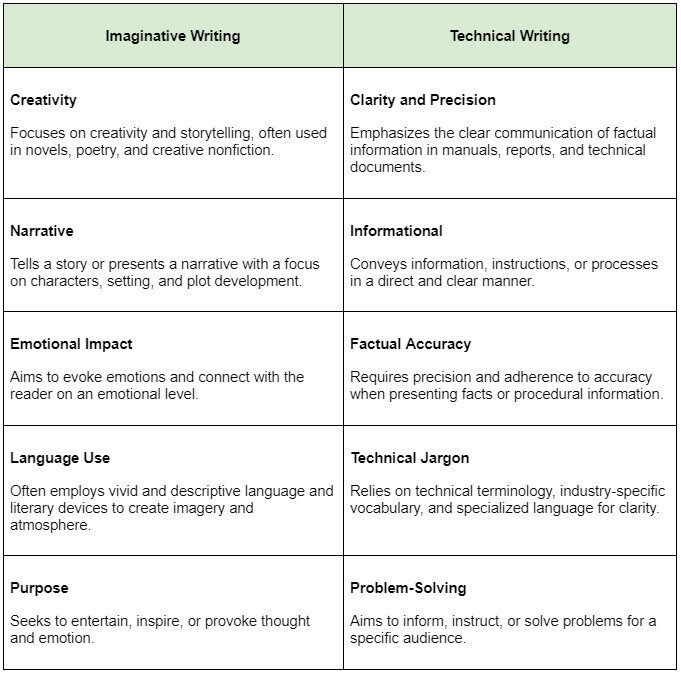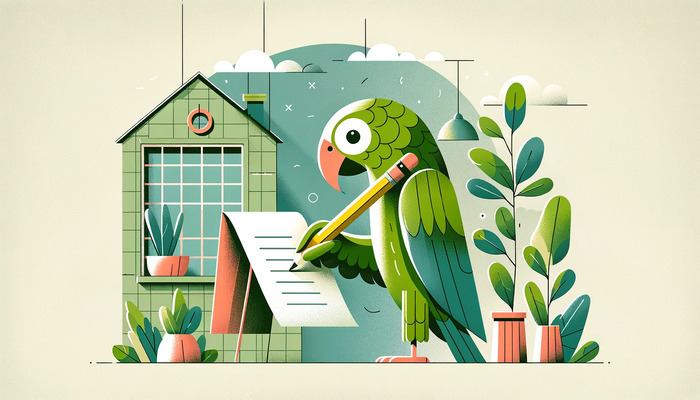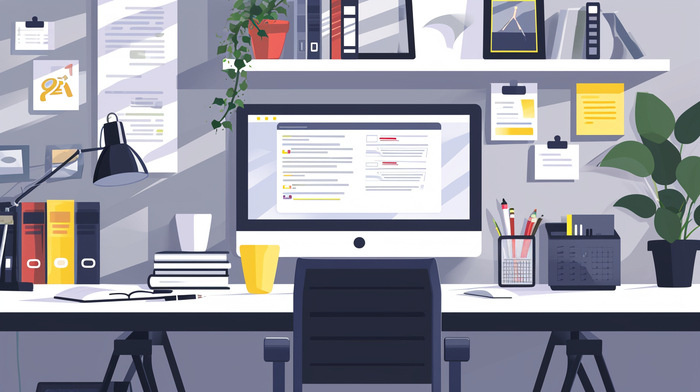Imaginative Writing vs. Technical Writing
 Elmirain Technical Writing on 2/21/2024 — 5 minute read
Elmirain Technical Writing on 2/21/2024 — 5 minute read Elmirain Technical Writing on 2/21/2024 — 5 minute read
Elmirain Technical Writing on 2/21/2024 — 5 minute read

Imaginative writing and technical writing are two completely different forms of writing, each requiring different skills and approaches.
Imaginative writing is another term for fiction writing and means the creation of imaginative, fictional stories that can take the form of novels, short stories, plays, etc. It involves the use of literary devices, such as character development, dialogue, setting, and plot, to create a compelling and engaging narrative. Fiction writers often focus on creating an emotional connection with the reader and evoking feelings and emotions through their writing.
On the other hand, technical writing is the creation of documents that convey technical or instructional information in a clear and concise manner. This type of writing is frequently used in fields such as engineering, science, technology, and business to communicate complex ideas and instructions to a specific audience. Technical writers must possess a strong understanding of the subject matter they are writing about and must be able to organize and present the information in a logical and accessible way.
This blog will focus on the difference between imaginative and technical writing, as well as the skills required for both fiction and technical writers. Additionally, you will learn about the resources that can help you create professional technical documentation.
The most notable stylistic difference between fiction and technical writing is the use of language and writing techniques. To captivate and amuse the reader, fiction authors frequently employ detailed vocabulary, complex metaphors, and a more imaginative and creative writing style. They might also use literary tropes like irony, foreshadowing, and symbolism to give the narrative more nuance and complexity.
On the other hand, technical writing is characterized by clarity, precision, and objectivity. The language used in technical writing is straightforward and concise, focusing on conveying information in a clear and understandable manner. Technical writers also use a more formal tone and structure, with an emphasis on the accuracy and logical organization of information. Additionally, technical writing often includes the use of visuals such as diagrams, charts, and graphs to supplement the written content and aid in comprehension.
From the standpoint of pragmatics, the differences between fiction and technical writing are rooted in the purpose and audience of the writing. Fiction aims to entertain and evoke emotion, while technical writing aims to inform and instruct in a clear and straightforward manner.
Stylistic and pragmatic differences between imaginative and technical writing can be summed up in the table below:

In summary, imaginative writing focuses on creating imaginative and engaging stories, while technical writing emphasizes conveying technical information in a clear and precise manner.
Theoretically, of course, it is possible for a novelist or short story writer to become a tech writer. In practice, it might be quite challenging as it will require changing the writing style completely. Besides, creating technical content may be quite a different experience, as it requires a certain technical background, for example, in the field of IT or engineering.
On the other hand, the skills and experience gained in fiction can be valuable in technical writing. For example, a novelist may have strong storytelling and narrative skills, which can be useful in writing user manuals or instructional documents. With some additional training in technical writing and familiarity with specific technical subjects, a fiction writer can successfully transition to a career in technical writing.
However, the profession of a journalist is much closer to technical writing. Strictly speaking, journalism refers to imaginative writing but partly. Every reporter deals with the narrative aspect of imaginative writing and uses the same stylistic devices as a novelist. On the other hand, unlike fiction writing, journalism is based on hard facts. These two aspects make the job of a reporter very close to that of a tech writer.
Among others that connect it to technical writing, journalism involves strong communication skills and the ability to convey information clearly to an audience. However, technical writing involves more focus on explaining complex ideas, processes, or products with clarity and precision, often for a specific audience such as users of software or hardware. Journalists often possess skills in research, interviewing, and storytelling, which can be valuable in technical writing, especially when it involves explaining technical concepts in a more accessible manner. With some additional training or self-study in technical areas, a journalist can certainly make a successful transition into the field of technical writing.

Currently, many tools are available to assist in the creation of technical documentation. Some popular ones include:
These resources offer various features such as templates, formatting options, collaboration capabilities, and support for incorporating images, tables, and other elements often found in technical documents. The choice will depend on the specific needs and preferences of the technical writer and the requirements of the project.

Imaginative and technical writing may appear different as they require different skills and abilities from writers. Nevertheless, a collaboration between imaginative and technical writers is quite possible and can result in rich, engaging, and informative documentation.
Imaginative writers often bring creativity, storytelling abilities, and a knack for engaging the audience to the table. They can use their skills to create compelling narratives, user scenarios, and examples that help the reader understand complex technical concepts. Technical writers, on the other hand, excel at translating complex technical information into clear, concise, and understandable content. They possess a deep understanding of the subject matter and can explain processes, procedures, and technical specifications in a systematic and organized manner.
When these two skill sets come together, the result is documentation that is both informative and engaging. Effective collaboration between imaginative and technical writers will lead to clear communication, an understanding of each other’s strengths, and a shared goal of creating documentation that meets the needs of the audience.
Good luck with your technical writing!
ClickHelp Team
Author, host and deliver documentation across platforms and devices
Get monthly digest on technical writing, UX and web design, overviews of useful free resources and much more.
"*" indicates required fields